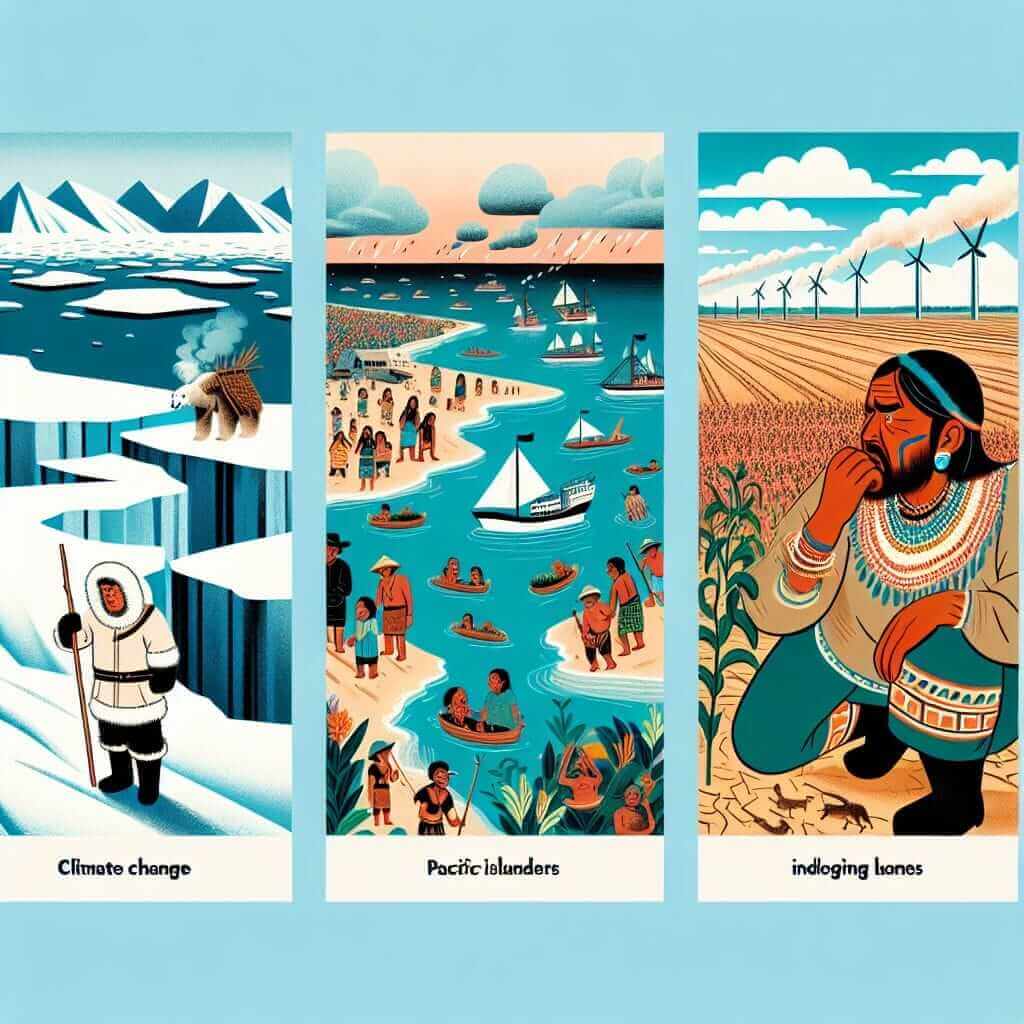Climate change is a pressing global issue with far-reaching consequences, and its effects are felt most acutely by marginalized communities, particularly indigenous peoples. This essay will delve into the unique challenges faced by indigenous communities due to climate change and explore potential solutions to mitigate these issues.
This topic has been featured in the IELTS Writing Task 2 exam before, and understanding its complexities is crucial for achieving a high band score. Here are some potential essay questions related to this topic:
- Climate change disproportionately affects indigenous communities around the world. What are some of the specific challenges they face, and what measures can be taken to address these issues?
- Indigenous knowledge and practices can play a vital role in mitigating the impacts of climate change. To what extent do you agree or disagree with this statement?
- Discuss the social, economic, and environmental consequences of climate change on indigenous populations, and suggest ways to promote their resilience and adaptation.
Sample Essay: Climate Change and Indigenous Communities
Analysis of the Question
Let’s choose the first question for our sample essay:
Climate change disproportionately affects indigenous communities around the world. What are some of the specific challenges they face, and what measures can be taken to address these issues?
This question requires us to:
- Acknowledge: Recognize the disproportionate impact of climate change on indigenous communities.
- Identify: Pinpoint specific challenges faced by these communities.
- Propose: Suggest measures to address the identified challenges.
Model Essay
Climate change is a global crisis that does not discriminate in its reach, yet its impacts are felt most profoundly by vulnerable populations, particularly indigenous communities worldwide. These communities, often residing in fragile ecosystems, face a unique set of challenges exacerbated by climate change. This essay will delve into these specific challenges and explore potential solutions to mitigate the adverse effects of this global phenomenon on indigenous peoples.
One of the most pressing challenges is the threat to their livelihoods and food security. Indigenous communities often rely heavily on subsistence farming, fishing, and hunting, activities intricately linked to their local environments. Climate change, with its erratic weather patterns, prolonged droughts, and rising sea levels, disrupts these traditional practices, jeopardizing their ability to sustain themselves. For instance, in the Arctic, melting ice caps threaten the hunting grounds of Inuit communities, while in the Pacific Islands, rising sea levels are salinating freshwater sources, impacting agriculture and increasing the risk of displacement.

Furthermore, climate change poses significant risks to the health and well-being of indigenous peoples. Extreme weather events such as floods and heatwaves can lead to injuries, displacement, and the spread of infectious diseases. Moreover, the loss of traditional lands and resources can have severe psychological and cultural impacts, leading to a sense of displacement and loss of identity. This is particularly true for communities whose cultural practices and spiritual beliefs are deeply rooted in their natural surroundings.
Addressing these complex challenges requires a multifaceted approach that involves empowering indigenous communities and integrating their traditional knowledge into climate action plans. Firstly, governments and international organizations must prioritize the needs and voices of indigenous peoples in climate change policies and initiatives. This includes providing financial and technical support to help them adapt to the changing environment and strengthen their resilience. For example, investing in drought-resistant crops, developing early warning systems for extreme weather events, and supporting sustainable land management practices can significantly enhance their capacity to cope with climate impacts.
Secondly, recognizing and valuing indigenous knowledge systems is crucial for developing effective adaptation and mitigation strategies. Indigenous communities have lived in harmony with nature for centuries, accumulating a wealth of knowledge about their local ecosystems and sustainable resource management practices. By incorporating their traditional ecological knowledge into climate action plans, we can develop more holistic and culturally appropriate solutions. For instance, indigenous communities in the Amazon rainforest have long practiced agroforestry, a technique that integrates trees and crops, promoting biodiversity and carbon sequestration.
In conclusion, climate change poses a grave threat to indigenous communities worldwide, impacting their livelihoods, health, and cultural identity. However, by acknowledging their unique vulnerabilities, empowering them to participate in decision-making processes, and integrating their traditional knowledge into climate action, we can create a more just and sustainable future for all. Only through collaborative efforts can we effectively address this global challenge and ensure the well-being of both present and future generations.
Word count: 422
Notes on the Essay
- Structure: The essay follows a clear and logical structure, addressing all parts of the question.
- Vocabulary: The essay employs a wide range of vocabulary related to climate change and its impact on indigenous communities.
- Grammar: The essay demonstrates a good command of grammar and syntax.
- Content: The content is relevant, well-developed, and supported with specific examples.
Vocabulary
- Disproportionately (adv.): To an extent that is out of proportion. (Pronunciation: /ˌdɪs.prəˈpɔː.ʃə.nət.li/)
- Fragile (adj.): Easily broken or damaged; delicate. (Pronunciation: /ˈfrædʒ.aɪl/)
- Exacerbated (v.): Made worse. (Pronunciation: /ɪɡˈzæs.ə.beɪ.tɪd/)
- Subsistence farming (n.): Farming that provides enough food for the farmer and their family but not enough to sell. (Pronunciation: /səbˈsɪs.təns ˈfɑː.mɪŋ/)
- Erratic (adj.): Not regular or consistent; unpredictable. (Pronunciation: /ɪˈræt.ɪk/)
- Salinating (v.): Making something salty. (Pronunciation: /ˈseɪ.lɪ.neɪ.tɪŋ/)
- Resilience (n.): The ability to recover quickly from difficulties; toughness. (Pronunciation: /rɪˈzɪl.i.əns/)
- Mitigate (v.): To make something less harmful, unpleasant, or bad. (Pronunciation: /ˈmɪt.ɪ.ɡeɪt/)
- Holistic (adj.): Relating to or concerned with complete systems rather than with individual parts. (Pronunciation: /hoʊˈlɪs.tɪk/)
Conclusion
Writing a compelling IELTS essay on the effects of climate change on indigenous peoples requires a strong understanding of the topic, relevant vocabulary, and a clear structure. By analyzing sample questions, practicing writing essays, and reviewing model answers, you can improve your writing skills and achieve your desired band score. Remember to focus on clarity, accuracy, and providing specific examples to support your points.